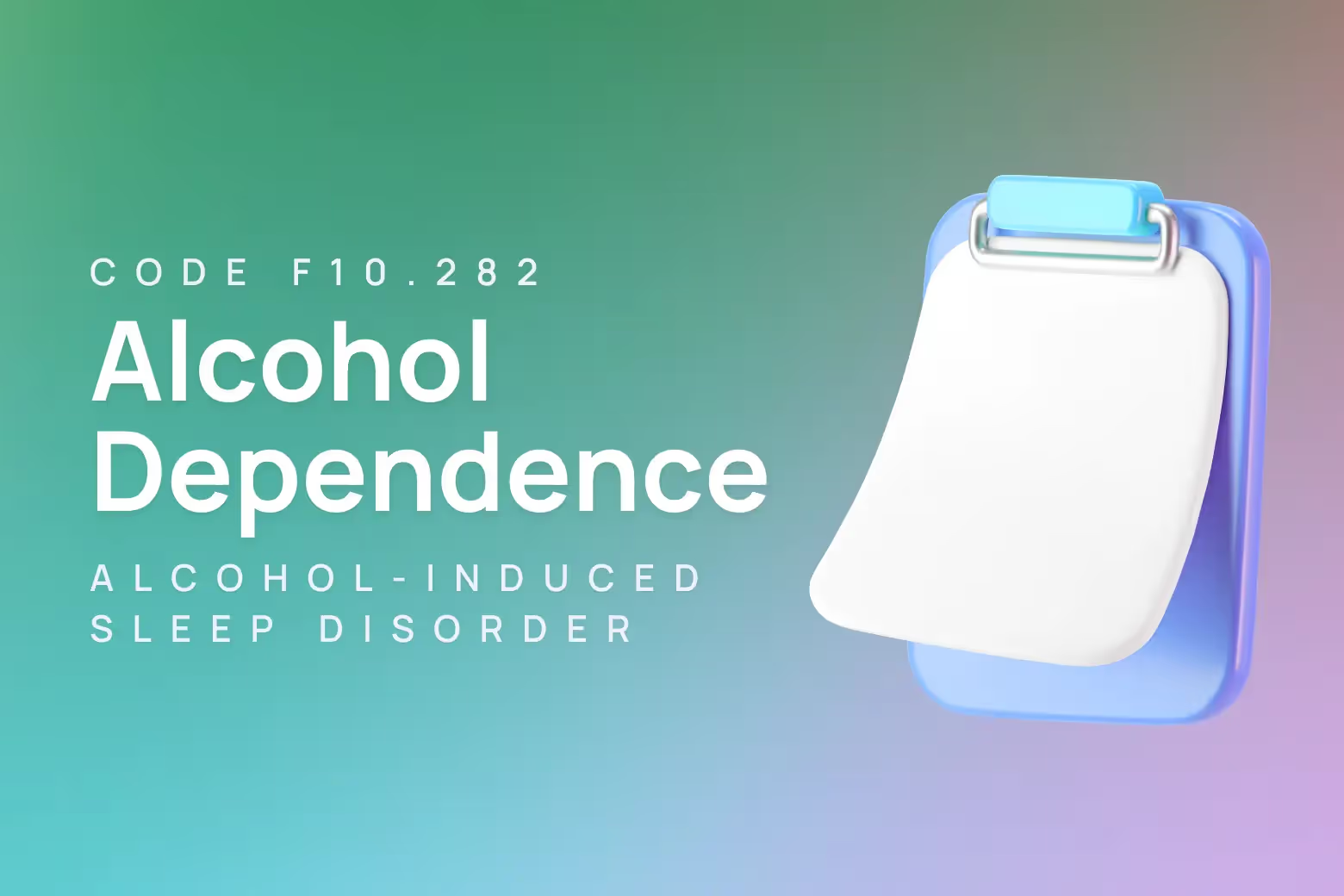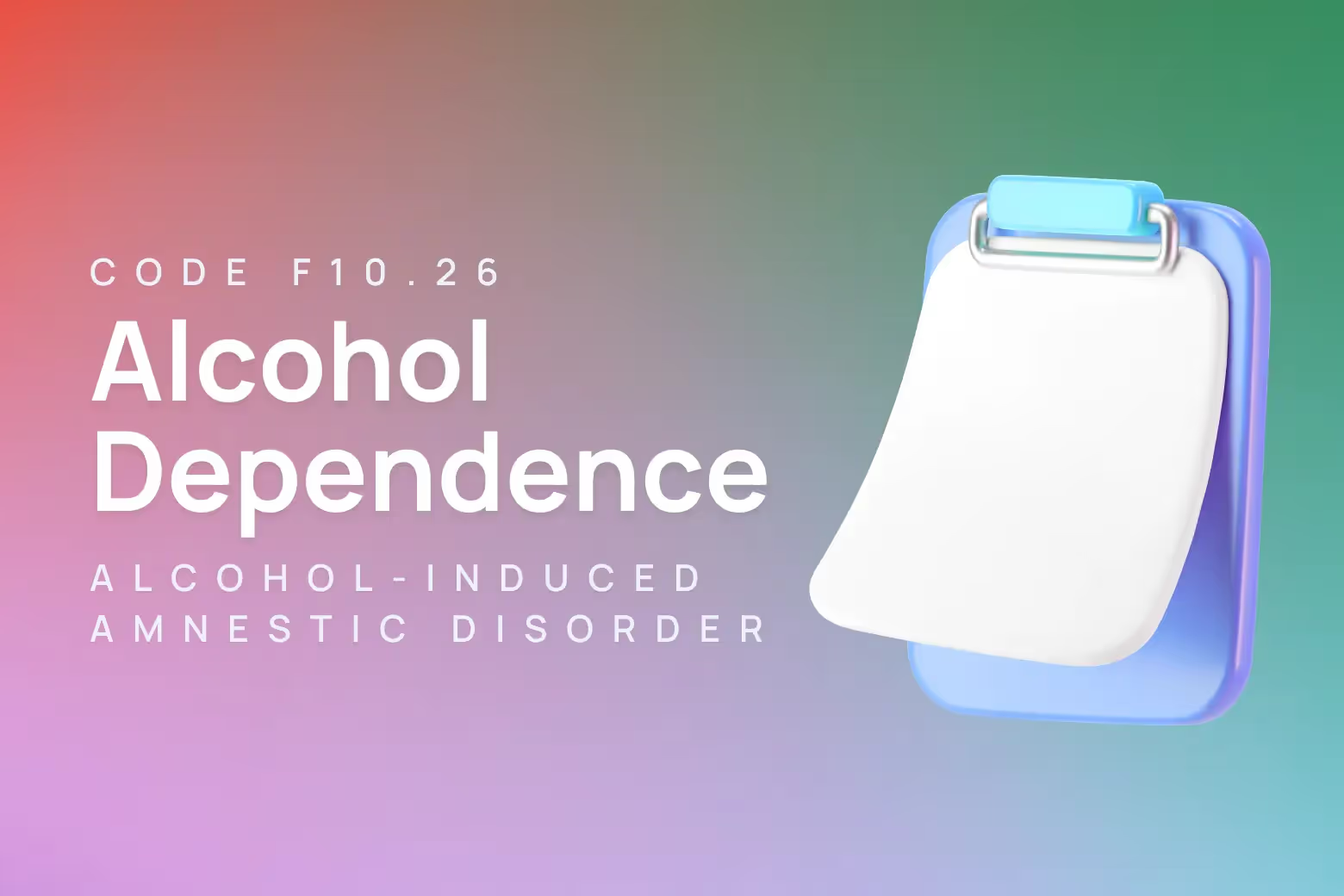ICD-10 code for alcohol dependence with alcohol-induced sleep disorder

F10.282 is the ICD-10 code for alcohol dependence with alcohol-induced sleep disorder.
This diagnosis captures individuals who meet criteria for alcohol use disorder alongside significant sleep disturbances directly caused by chronic alcohol consumption.
Precise diagnostic coding supports appropriate treatment planning and insurance authorization for comprehensive care addressing both the addiction and related sleep complications.
Key features:
- Combines alcohol dependence with alcohol-induced sleep disturbances
- Requires documented sleep problems directly related to alcohol use patterns
- Fourth character indicates severity of underlying alcohol use disorder
- Supports integrated treatment approaches for dual conditions

Diagnostic criteria for alcohol dependence with sleep disorder (F10.282)
Assigning F10.282 requires meeting both alcohol use disorder criteria and demonstrating alcohol-induced sleep dysfunction.
The underlying alcohol use disorder must present with at least two symptoms from the established criteria within a twelve-month period, including:
- impaired control over drinking
- persistent desire to reduce consumption
- excessive time spent obtaining or using alcohol
- craving
- role impairment
- social problems
- hazardous use
- continued use despite problems
- tolerance
- withdrawal symptoms
Sleep disturbances must be directly attributable to alcohol consumption patterns rather than independent sleep disorders. Common presentations include:
- difficulty falling asleep
- frequent nocturnal awakening
- early morning awakening
- non-restorative sleep
- disrupted sleep architecture
These sleep problems typically emerge during periods of regular alcohol use and may persist into early recovery periods.
The fourth character in F10.282 indicates alcohol use disorder severity:
- F10.182 indicates mild alcohol dependence (2-3 symptoms) with sleep disorder
- F10.282 indicates moderate to severe dependence (4+ symptoms) with sleep disorder
The sleep disorder component must represent clinically significant distress or impairment beyond what would be expected from alcohol intoxication or withdrawal alone.
When to use F10.282 diagnosis code
Accurate differential diagnosis helps distinguish F10.282 from related conditions that may present with similar symptom patterns but require different diagnostic codes and treatment approaches.
F10.282 vs F10.28 (Alcohol dependence with other alcohol-induced disorders)
F10.282 specifically identifies sleep disorders as the primary alcohol-induced complication, while F10.28 serves as a general category for other alcohol-related mental health conditions.
Sleep-specific coding with F10.282 provides more precise clinical information for treatment planning and allows targeted interventions addressing sleep hygiene, circadian rhythm disruption, and sleep architecture restoration.
F10.282 vs F10.232 (Alcohol dependence with withdrawal, with perceptual disturbance)
While both codes involve alcohol dependence complications, F10.232 specifically addresses acute withdrawal symptoms including perceptual disturbances, whereas F10.282 focuses on chronic sleep disruption that persists beyond withdrawal periods.
The sleep disorder in F10.282 typically requires sustained intervention even after withdrawal symptoms resolve.
Related ICD-10 codes
Related diagnostic codes from the alcohol-induced disorder family include:
- F10.280 - Alcohol dependence with alcohol-induced anxiety disorder
- F10.281 - Alcohol dependence with alcohol-induced sexual dysfunction
- F10.288 - Alcohol dependence with other alcohol-induced disorder
- F10.10 - Alcohol use disorder, mild
- F10.20 - Alcohol use disorder, moderate to severe
Interventions and CPT codes for alcohol dependence with sleep disorder
Evidence-based treatment approaches target both alcohol dependence and sleep restoration through integrated interventions that address underlying neurobiological disruption.
Individual psychotherapy interventions
Cognitive behavioral therapy for insomnia (CBT-I) represents the first-line psychological intervention for alcohol-related sleep disorders.
This approach addresses sleep-interfering cognitions, establishes healthy sleep hygiene practices, and restores normal circadian rhythms disrupted by chronic alcohol use.
CBT-I typically requires 6-8 sessions focusing on sleep restriction, stimulus control, and cognitive restructuring around sleep-related anxiety.
Motivational interviewing and cognitive behavioral therapy for substance use disorders address the underlying alcohol dependence while incorporating sleep-focused psychoeducation.
These approaches help clients understand the bidirectional relationship between alcohol use and sleep quality, supporting motivation for sustained recovery.
Relevant CPT codes:
- 90791 - Psychiatric diagnostic evaluation for comprehensive intake assessment
- 90834 - Individual psychotherapy, 45 minutes (CBT-I or substance use focused therapy)
- 90837 - Individual psychotherapy, 60 minutes for complex cases requiring extended sessions
Group therapy approaches
Group psychotherapy provides peer support while addressing shared challenges around sleep restoration during recovery.
Groups focused on relapse prevention often incorporate sleep hygiene education and stress management techniques that support both sobriety maintenance and sleep quality improvement.
Relevant CPT codes:
- 90853 - Group psychotherapy for substance use disorder with sleep component
Screening and brief intervention services
Structured screening helps identify sleep problems in clients presenting for alcohol treatment, supporting early intervention before sleep disorders become entrenched.
Brief interventions provide psychoeducation about alcohol's impact on sleep architecture and introduce basic sleep hygiene principles.
Relevant CPT codes:
- 99408 - Structured screening and brief intervention, 15-30 minutes
- 99409 - Structured screening and brief intervention, greater than 30 minutes
- 96127 - Brief emotional/behavioral assessment per standardized instrument
How Upheal improves F10.282 ICD-10 documentation
Upheal's clinical documentation platform helps behavioral health providers deliver comprehensive care for clients with alcohol dependence and sleep disorders while maintaining accurate diagnostic records.
Suggesting appropriate ICD-10 codes based on session content
The platform analyzes session transcripts and clinical notes to identify key symptoms indicating both alcohol use disorder criteria and sleep-related complaints.
By recognizing patterns like sleep disruption following drinking episodes, withdrawal-related insomnia, or chronic sleep architecture problems, Upheal helps clinicians consider F10.282 when both conditions co-occur.
This intelligent code suggestion reduces diagnostic oversights and supports more complete clinical documentation.
Maintaining HIPAA-compliant records with proper diagnostic coding
Upheal generates structured progress notes that clearly document alcohol use patterns, sleep symptom severity, and treatment responses in compliance with healthcare documentation standards.
The platform tracks changes in both alcohol consumption and sleep quality over time, creating a comprehensive clinical picture that supports F10.282 diagnosis accuracy.
All documentation maintains strict HIPAA compliance while providing the detailed records needed for insurance authorization and treatment planning.
Reducing administrative burden so you can focus on client care
Automated documentation features free clinicians from extensive note-taking during sessions, allowing deeper focus on therapeutic interventions addressing both addiction and sleep restoration.
The platform handles routine documentation tasks like symptom tracking, treatment goal updates, and progress monitoring, giving providers more time for direct client engagement.
This improved efficiency supports better outcomes for complex cases requiring integrated treatment approaches.
Supporting clients with alcohol dependence and sleep disorder
Clients with F10.282 require integrated treatment approaches that address both alcohol dependence and sleep restoration as interconnected aspects of recovery.
Sleep disturbances often perpetuate alcohol use patterns, as individuals may drink to cope with insomnia or use alcohol as a sleep aid, creating a cycle that maintains both conditions.
Treatment planning should recognize that sleep improvements may take weeks to months following alcohol cessation, as the brain requires time to restore normal sleep architecture disrupted by chronic alcohol exposure.
Early recovery often involves temporary sleep difficulties that require supportive interventions and realistic expectation setting to prevent relapse.
Upheal's documentation platform supports this complex treatment process by tracking both alcohol use patterns and sleep quality metrics, helping clinicians identify treatment progress and adjust interventions as needed.
The platform's comprehensive progress tracking and intelligent code suggestions help ensure thorough documentation while allowing clinicians to focus on delivering effective care.
Try Upheal for free to experience how automated documentation can improve care quality for clients with complex dual diagnoses like F10.282.













